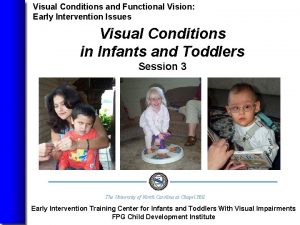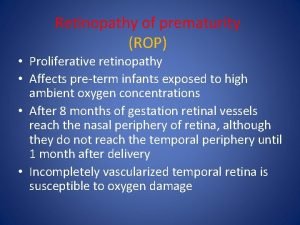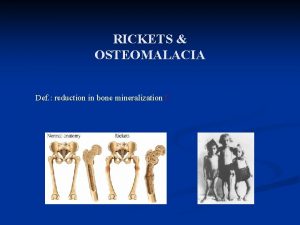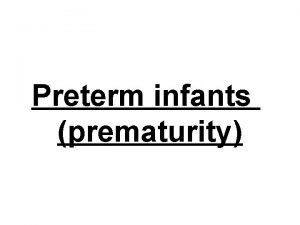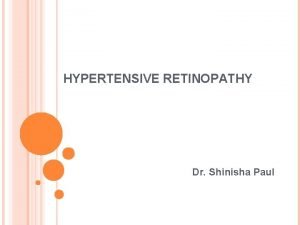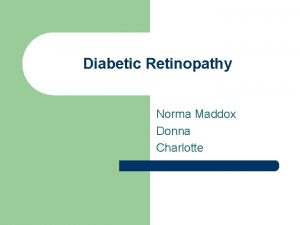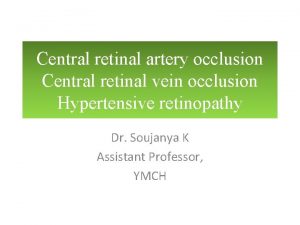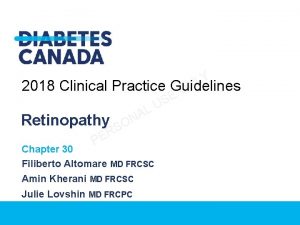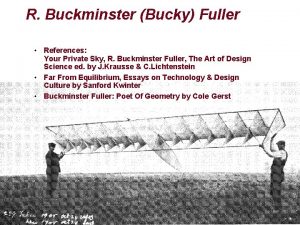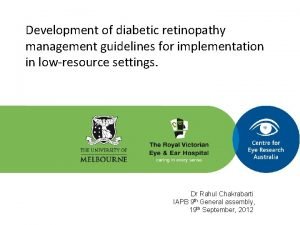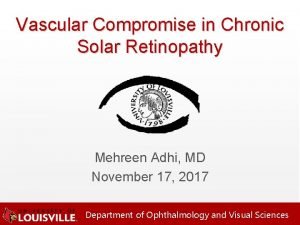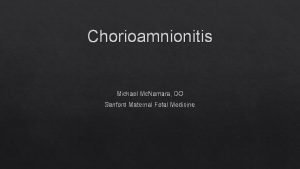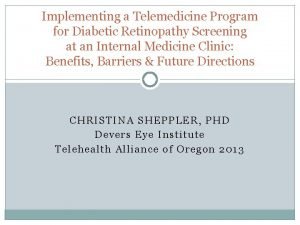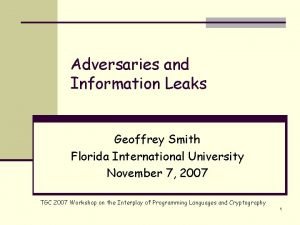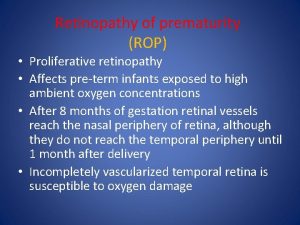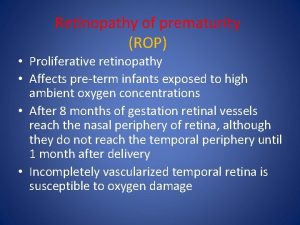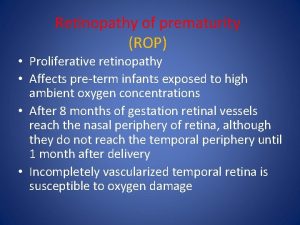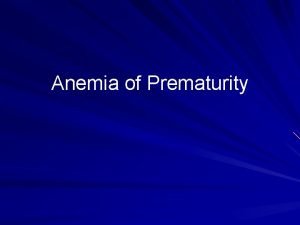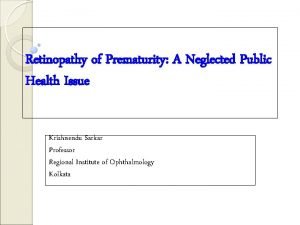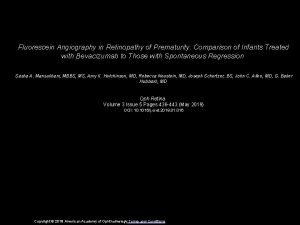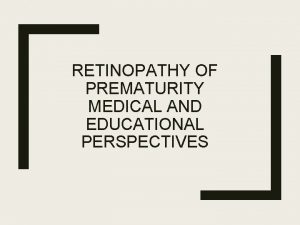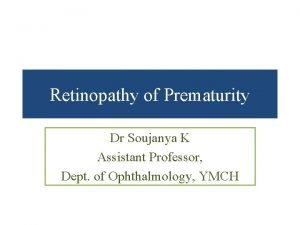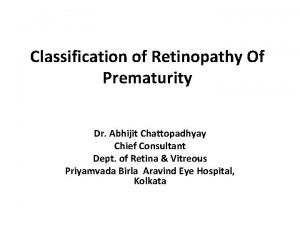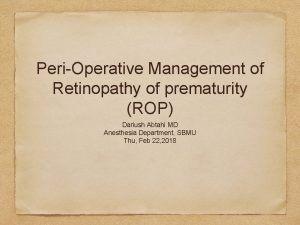Retinopathy of Prematurity Geoffrey T Tufty MD Sanford




















































- Slides: 52

Retinopathy of Prematurity Geoffrey T. Tufty, MD Sanford Clinic Ophthalmology

Definition Failure of the peripheral retina to vascularize

ROP

Objectives To understand the etiology of ROP To understand the anatomy of the eye To understand the stages/severity of ROP To understand the zones/location of ROP To understand the screening guidelines for ROP To understand the treatment options for ROP To understand the long term affects of ROP

ROP-historical 1942 - Terry Leading cause of childhood blindness Retro lental fibroplasia 4 million premature babies born each year 14, 000 have ROP 90% of those are mild cases and resolve

Retro lental fibroplasia Fibrous mass behind the lens is detached retina

Risk factors Low birth weight Early gestational age Anemia Respiratory distress Poor weight gain Blood transfusion Multiples Intraventricular hemorrhage Low vitamin E ? light exposure

When to Screen? ? BW <1500 grams <32 weeks >32 weeks with a difficult clinical course 4 weeks of age or 31 weeks which ever is first

Normal Retinal Development Nasal(32 weeks) then temporal (40 weeks) VEGF Stimulates normal development-reduced by hyperoxia-cessation of growth Hypoxic retina upregulates VEGF and thus ROP Immature retina-hyperoxiaproduces VEGF and neo grows- ROP

Anatomy of the Eye Tear film Cornea Iris Lens Vitreous Retina-macula Optic nerve

Retina Normal retina fully developed

Tools of the trade Dilating drops-cyclomydril Anesthetic drops

Tools of the trade

Indirect Ophthalmoscope

Good help You need to swaddle the baby and take your time but be efficient. Get a good look. Using the “force” does not work

Ret-Cam Used for retinal photos to detect ROP and other forms of retinal pathology

Let’s set the Stages are the severity of the ROP The higher the stage the worse the disease

Stage 1 ROP A demarcation line between normal retinal vasculature and avascular retina

Stage 1

Stage 1 ROP

Stage 2 ROP The demarcation line between vascular retina has increased volume

Stage 2 ROP The demarcation line has volume to it.

Stage 3 ROP Neovascularization on the dividing line between vascular and avascular retina

Stage 3 ROP Continuous neovascularization Popcorn Sausage

Stage 3 ROP

Stage 4 A ROP Extra foveal retinal detachment

Stage 4 A ROP Peripheral retina is being pulled off of the attachments-traction

Stage 4 B ROP Traction and detachment of the fovea-center vision

Stage 5 ROP Bad- total tractional retinal detachment

Stage 5 ROP Poor overall visual outcomes despite aggressive treatment

Plus Disease Increase in venous and arteriolar dilation Due to blood shunting Indicates severity

No Zoning Out

Get into the Zone Location of ROP in the eye Higher the zone-the better

Zone I A circle with the optic nerve as the center and extends twice the distance from the optic disc to the macula

Zone II From zone I to the nasal peripheral retina

Zone III Temporal retinal crescent

Follow up Exams 1 week Early zone II Zone I stage 1 or 2 progression 2 weeks Zone II immature Zone II stage 1 or 2 Zone II no ROP 3 weeks Zone III

When to treat? ? Zone 1 ROP any stage with Should be treated within plus disease 72 hours Zone I stage 3 no plus Zone II stage 2 or 3 with plus

Treatment In the NICU? In the OR? Sit down with family and cover everything-layman’s terms

Treatment Cryotherapy

Cryotherapy Cryo ROP study in 1986 reduced unfavorable outcomes from Eyes are red and sore

Cryotherapy

Laser Portable Learning curve Less painful

Laser

Laser ROP may get worse before it gets better

Avastin Anti VEGF therapy

Injection Dosage- half the adult dose 30 g needle Betadine Pars plana

Avastin Risks of injection Infection Cataract Normal vascularization What is the correct dosage Frequency Developing brain and organs Long term follow up

Vitrectomy Surgical reattachment of the retina 40% of stage 5 2/3 rds of stage 4 Visual outcomes are generally poor

Risk Factors of Treatment Blindness Retinal detachment-traction Strabismus Myopia Anisometropia Cataract Amblyopia Low vision

Aids Glasses Low vision aids Magnifiers Computers/tablets CCTV Large print books Good lighting Low vision teachers School for the blind Good communication with parents and teachers

Questions? ? ? When it comes to ROP there is no zoning out. If you do, you will set the stage for disaster Thank you!!!
 Retinopathy of prematurity
Retinopathy of prematurity Retino patia
Retino patia Dr tufty sioux falls
Dr tufty sioux falls Osteoid definition
Osteoid definition Causes of prematurity
Causes of prematurity Preceptor miriam
Preceptor miriam Diabetic retinopathy clinical research network
Diabetic retinopathy clinical research network Diabetic retinopathy clinical research network
Diabetic retinopathy clinical research network Keith wagner grading
Keith wagner grading Scs 770069 power relay
Scs 770069 power relay Drcr net
Drcr net Diabetic retinopathy charlotte nc
Diabetic retinopathy charlotte nc Sanford middle school staff
Sanford middle school staff Cattle trucking retina
Cattle trucking retina Sanford underground research facility
Sanford underground research facility Sanford t colb
Sanford t colb Sanford dickert
Sanford dickert Diabetic retinopathy grading
Diabetic retinopathy grading Desco industries inc.
Desco industries inc. Leighton broadcasting grand forks
Leighton broadcasting grand forks Lystatin
Lystatin Spencer macquarrie
Spencer macquarrie Albany diabetic retinopathy
Albany diabetic retinopathy Diabetic retinopathy clinical research network
Diabetic retinopathy clinical research network Diabetic retinopathy clinical research network
Diabetic retinopathy clinical research network Sanford middle school dress code
Sanford middle school dress code Sanford creek greenway
Sanford creek greenway Diabetic retinopathy
Diabetic retinopathy Sanford christie barnum
Sanford christie barnum Solar retinopathy
Solar retinopathy Sanford maternal fetal medicine
Sanford maternal fetal medicine Diabetic retinopathy clinical research network
Diabetic retinopathy clinical research network Diabetic retinopathy screening reimbursement
Diabetic retinopathy screening reimbursement Geoffrey fox
Geoffrey fox Mixed quantifiers
Mixed quantifiers Sports med udel
Sports med udel Geoffrey brown nsf
Geoffrey brown nsf Professor geoffrey smith fiu
Professor geoffrey smith fiu Prince royce
Prince royce Geoffrey hinton backpropagation
Geoffrey hinton backpropagation Prairielearn ubc
Prairielearn ubc Geoffrey brown iu
Geoffrey brown iu Geoffrey pritchard
Geoffrey pritchard Geoffrey chaucer notes
Geoffrey chaucer notes Jane pilkington gender theory
Jane pilkington gender theory Performer heritage geoffrey chaucer
Performer heritage geoffrey chaucer Geoffrey panos
Geoffrey panos Geoffrey tien ubc
Geoffrey tien ubc Geoffrey curran
Geoffrey curran Leech 1974
Leech 1974 Geoffrey hamilton unece
Geoffrey hamilton unece Geoffrey ye li
Geoffrey ye li Geoffrey moore vision template
Geoffrey moore vision template
